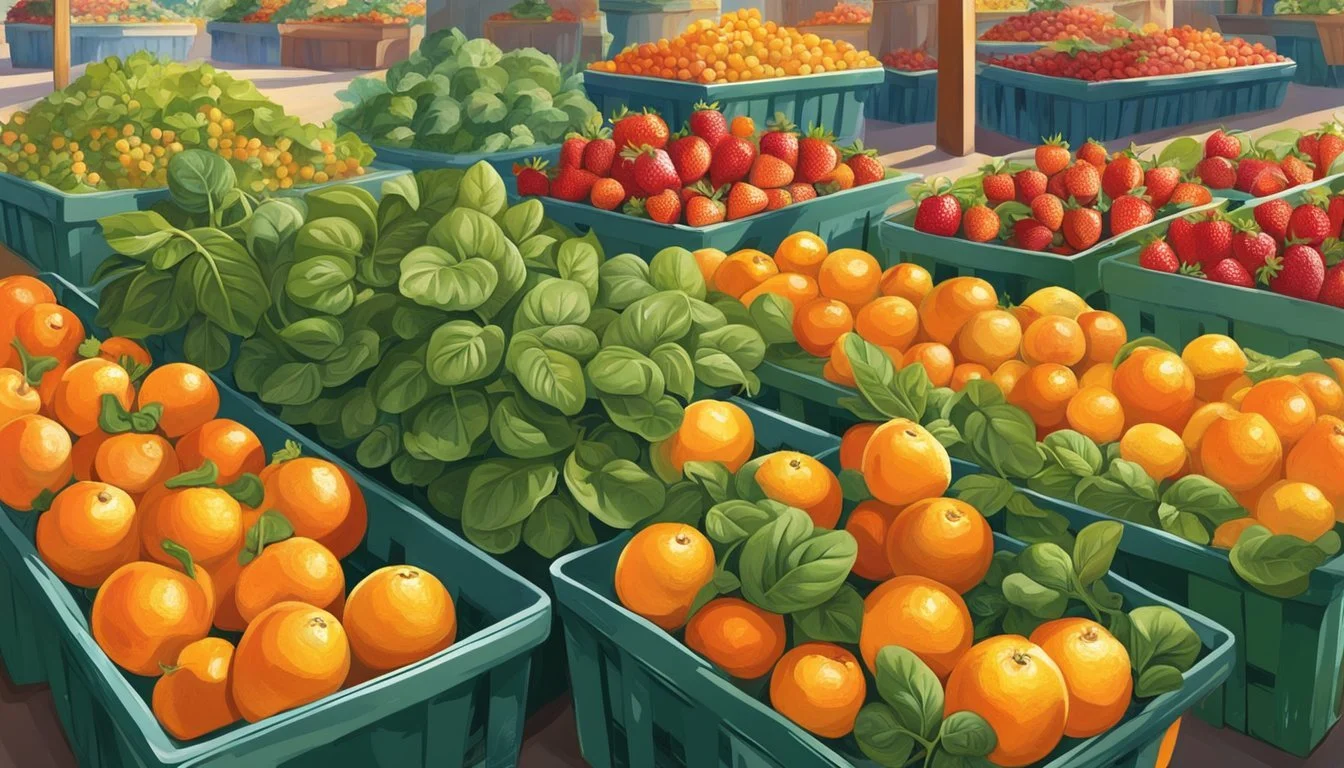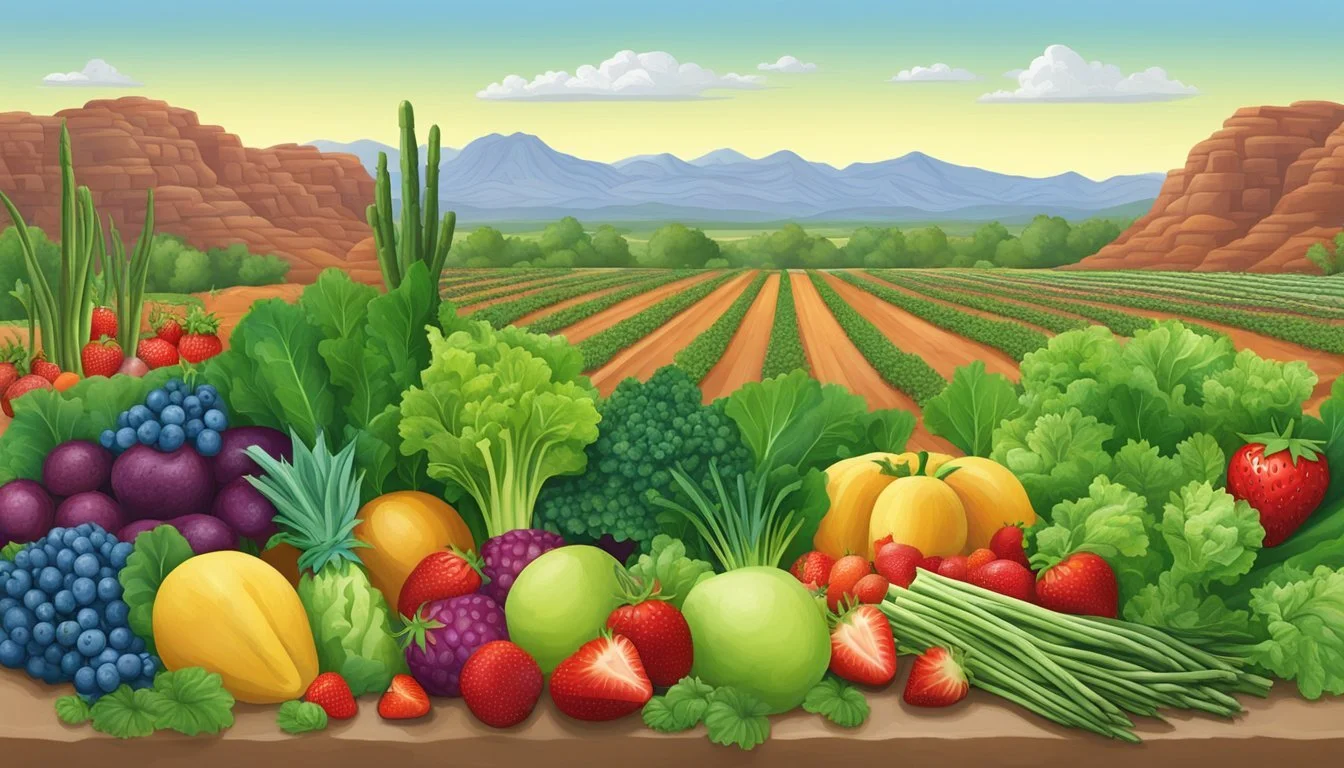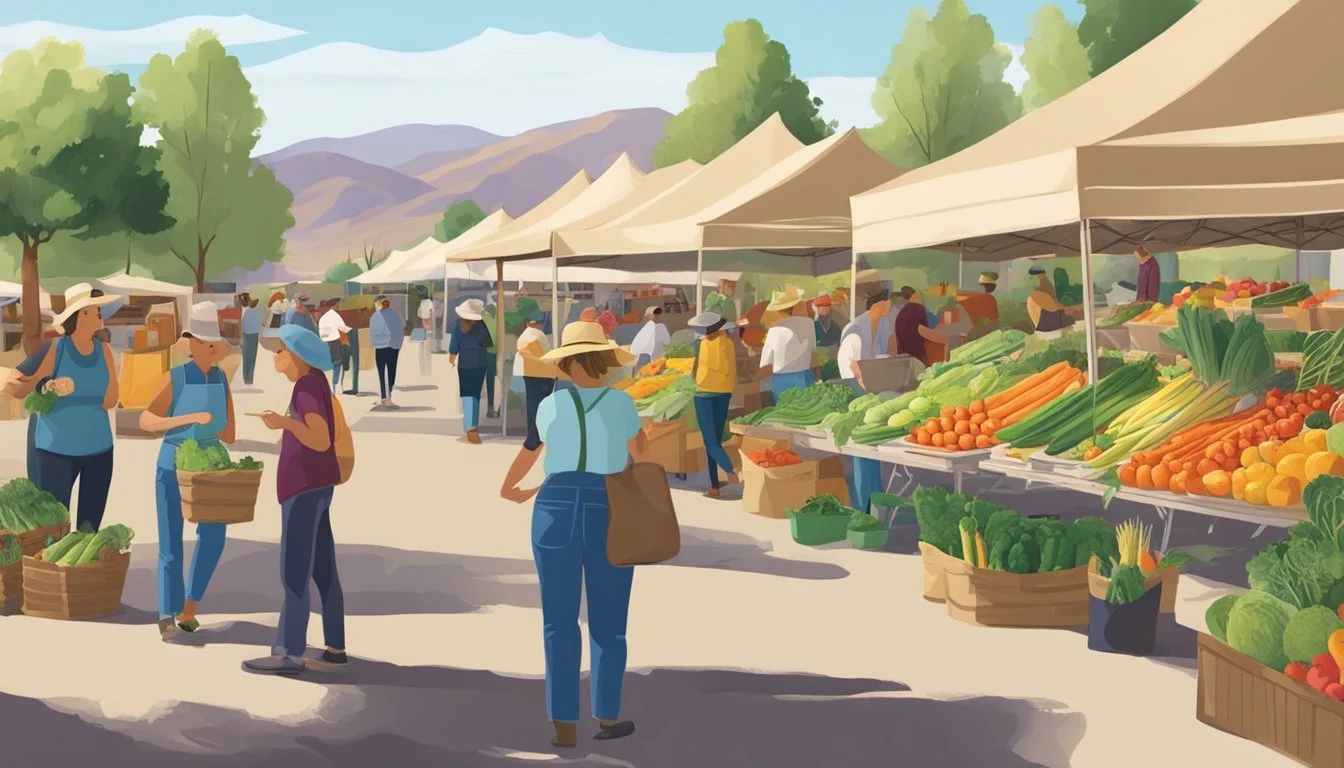Arizona Seasonal Fruit & Vegetables in April
Your Fresh Guide to Local Produce
This Article is Part of our Arizona Seasonal Fruit & Veg Calendar
In the arid yet fertile landscapes of Arizona, April is a transitional month that ushers in the bounties of spring harvests. As temperatures begin to rise, a variety of fruits (What wine goes well with fruits?) and vegetables reach their peak, offering fresh and flavorful options for consumers looking to support local agriculture. April's mild weather conditions are particularly conducive to the harvest of certain crops that thrive in the desert climate.
Local farmers' markets start to fill with the vibrant colors of seasonal produce. Among the ripe selections, asparagus (What wine goes well with asparagus?) emerges as a favorite, with its tender stalks ready for picking. Leafy greens like arugula (how long does arugula last?) and spinach also make a strong appearance, their lush leaves an indicator of the state’s ability to cultivate diverse crops despite its dry reputation. Citrus fruits, still basking in the tail end of their season, continue to provide juicy oranges and grapefruits, while the last of the root vegetables, such as beets (how long do beets last?), offer earthy flavors.
These offerings reflect the state's agricultural skill in managing water resources and selecting crops that flourish in its unique environment. April in Arizona not only showcases the variety and adaptability of its produce but also serves as a testament to the careful planning and cultivation practices honed by its local farmers. With each season, they sustainably provide both residents and visitors with fresh, high-quality food choices.
Overview of Arizona's Growing Seasons
Arizona's diverse climate and extended growing seasons allow for a wide variety of fruits and vegetables to thrive at different times of the year. The state's agricultural calendar is particularly prodigious during the spring months, including April.
Spring Harvest
April marks a notable point in Arizona's agricultural calendar, as spring is in full bloom, bringing forth a plethora of produce. During this season, specifically, consumers can enjoy:
Asparagus: March to April
Beets: Often available until May
Broccoli (how long does broccoli last?)and Broccoli Raab: Harvested through March
Brussels Sprouts: Typically end in March
The Spring Harvest showcases the tail end of winter crops as well as the beginning of warmer-weather produce.
Annual Growing Cycle
Arizona's growing cycle encompasses four distinct seasons, each contributing differently to the state's agricultural output:
Winter (December to February): Citrus fruits like oranges, grapefruits, and tangerines are prominent.
Spring (March to May): A transition period featuring the last of the cool-season crops and the start of warmer season varieties.
Summer (June to August): Peak season for many stone fruits, melons, and summer vegetables.
Fall (September to November): Harvest includes pumpkins, winter squashes, and a variety of root vegetables.
In April, as spring progresses, the state is in a transitional period where crops like leafy greens begin to make way for early summer fruits and vegetables. Moreover, planning for the upcoming summer harvest takes precedence, typically involving sowing seeds for melons and other heat-loving crops.
April's Seasonal Fruits in Arizona
April in Arizona sees a variety of fruits come into season, offering fresh flavors that range from the citrusy tang of local orchards to the sweet, mellow taste of ripe berries.
Citrus Fruits
In April, Arizona's citrus fruits are still in prime condition, with several varieties available.
Oranges: Valencia oranges are particularly sweet and juicy during this time.
Grapefruit: Offering a vibrant tang, grapefruit continues to be a breakfast staple.
Lemons: Essential for both culinary and beverage uses, lemons are readily available.
Tangelos: A hybrid fruit, tangelos are known for their juiciness and mild, sweet flavor.
Berries
While not as prominent as citrus, some berries start to make an appearance in Arizona during April.
Strawberries: Strawberries begin to ripen now, hinting at the full bounty to come.
Blackberries: (how long do blackberries last?) Early varieties of blackberries may start to appear in markets.
Exotic Fruits
Though not traditionally associated with Arizona, certain exotic fruits can be sourced from local growers in April.
Pineapple: While not native, pineapple reaches peak sweetness and can be found from select local producers who specialize in exotic fruits.
April's Seasonal Vegetables in Arizona
In April, Arizona vegetable enthusiasts can enjoy a diverse array of vegetables at their peak. This is the time when leafy greens, root vegetables, and a variety of other garden favorites are freshly available for harvest.
Leafy Greens
Spinach and lettuce are two leafy vegetables that thrive in April's mild temperatures. They are joined by artichokes, (What wine goes well with artichokes?) offering their unique flavor to the array of greens.
Spinach – a versatile and nutrient-rich option, perfect for salads or cooking.
Lettuce – crisp and fresh, available in various types to elevate any salad.
Root Vegetables
Root vegetables such as carrots, beets, and radishes are in season, providing depth and flavor to dishes.
Carrots – sweet and crunchy, ideal for raw snacks or roasted side dishes.
Beets – earthy and rich, pair well with other spring flavors.
Radishes – offer a peppery kick, great for salads or as a garnish.
Other Vegetables
April also marks the availability of asparagus, peas, and sweet onions. These vegetables can enhance a multitude of recipes and are especially good when picked fresh.
Asparagus – tender and perfect for quick cooking methods like grilling or steaming.
Peas – sweet and plump, signaling the coming of warmer months.
Sweet Onions – less pungent than their winter counterparts, adding mild sweetness to dishes.
Harvesting and Storage Tips
Harvesting in Arizona in April takes advantage of the mild temperatures which are conducive for a variety of fruits and vegetables. Proper handling and storage are crucial for maintaining the freshness and flavor of the harvested produce.
Fruit Handling
When harvesting fruit in Arizona during April, one should carefully pick the fruit to avoid bruising. Citrus fruits, common during this season, should be picked when fully ripe, as they do not continue to ripen after being harvested.
Citrus: Store at a cool room temperature away from direct sunlight for up to a week, or refrigerate to extend shelf life up to three weeks.
Stone fruits (if available late in the month): Refrigerate immediately and consume within a week for optimal taste.
For fruits intended for recipes, ensure they are at their peak ripeness before use to maximize flavor.
Vegetable Preservation
Vegetables harvested in the month of April should be cleaned and dried before storage to prevent molding or spoilage.
Leafy greens: Wrap loosely in a paper towel and store in a perforated plastic bag in the refrigerator.
Root vegetables: Store in a cool, dark, and well-ventilated place; if greens are attached, remove them to prevent moisture loss.
One can consider blanching and freezing vegetables to retain their nutritional value if they are not planned to be used immediately in recipes.
Health Benefits and Nutritional Information
April in Arizona offers an abundance of fruits and vegetables rich in nutrients that are essential for maintaining good health. This bounty provides a variety of vitamins and minerals, and aligns with dietary recommendations for a balanced diet.
Vitamins and Minerals
Arizona's seasonal produce in April is a powerhouse of vitamins and minerals. Leafy greens such as arugula, which is available from September through May, are high in Vitamin K, essential for blood clotting and bone health. Beets, harvested November through May, are a great source of folate, crucial for DNA repair and cell growth. Greens, roots, and leaves are generally low in calories and high in dietary fiber.
Produce Vitamins Minerals Arugula Vitamin K, Vitamin C Calcium, Potassium Beets Folate, Vitamin C Iron, Manganese Bok Choy Vitamin A, Vitamin C Iron, Zinc
Dietary Recommendations
Consuming a variety of fruits and vegetables, such as those found in Arizona's spring harvest, supports the dietary recommendations set forth by health organizations. Adults are advised to eat 1.5-2 cups of fruits and 2-3 cups of vegetables each day. Not only do these foods provide essential nutrients, but they also contribute to the reduction of chronic diseases.
Greens: Consume different types of leafy greens for a good intake of Vitamin A.
Roots: Include root vegetables like beets for an increase in fiber and folate.
Leaves and Stems: Incorporating a mix of these provides a diverse array of nutrients that can aid in overall health.
Arizona's fruits and vegetables of April contribute significantly to the fulfillment of these nutritional goals.
Cooking and Recipe Ideas
In Arizona, April's bounty offers a fresh palette for the kitchen, allowing cooks to craft an array of flavorful dishes. With seasonal produce like basil (how long does basil last?) and mint flourishing, there’s ample opportunity to infuse meals with fresh, vibrant flavors.
Seasonal Recipes
Basil is a star in April and can be used to elevate simple dishes. It's a classic ingredient in pesto, which pairs wonderfully with pasta and fresh spring vegetables like asparagus. Here are two standout recipes:
Spring Vegetable Pesto Pasta: A dish that combines penne with blanched asparagus and a homemade basil pesto. Garnish with grated Parmesan for an extra touch.
Tomato Basil Soup: This warming dish is simple yet satisfying and can be served alongside a crisp salad for a light April lunch.
Mint offers a refreshing note to both sweet and savory dishes. It's especially delightful when used in recipes like:
Minted Pea Soup: A blend of fresh peas, mint leaves, and chicken or vegetable broth, pureed to create a smooth and cooling soup.
Lemon Mint Quinoa Salad: Quinoa provides a protein-rich base while chopped mint and a squeeze of lemon juice add zest.
Preparation Techniques
Cooking with fresh herbs like basil and mint requires gentle handling to preserve their delicate flavors:
Chiffonade is a technique used for basil where the leaves are stacked, rolled, and thinly sliced to create fine ribbons, perfect for garnishing and incorporating into salads and soups.
Bruising mint releases its oils, intensifying the aroma and taste. This can be done by gently pressing the leaves with the back of a spoon or a muddler, ideal for drinks and dressings.
Gardening Tips for Arizona
In Arizona's unique climate, successful gardening in April involves a mix of choosing the right crops and implementing savvy cultivation practices. Gardeners must pay attention to the specific needs of their plants, especially considering the dry conditions and intense sun exposure.
Planting Strategies
When planting in the arid Arizona climate, gardeners should select heat-loving and drought-tolerant plants. For April, it's the ideal month to start sowing summer squash, beets, and artichokes.
Vegetables to Plant Herbs to Plant Strawberries Basil Beets Cilantro Summer Squash Mint
Nasturtiums, with their beautiful, edible blooms, are a fantastic choice for both aesthetic and practical reasons. They reseed easily, ensuring a perennial presence once established.
Watering and Maintenance
The watering regimen for a garden in Arizona needs careful consideration due to the hot and arid conditions. Gardeners should maintain a consistent watering schedule, adjusting for the increase in temperatures as the month progresses. The goal is to provide deep water to encourage root growth but avoid water waste.
Ensuring proper mulch application helps retain soil moisture and maintain a cooler root environment. For maintenance, early April is a crucial time to:
Remove any cold-weather flowers that have wilted.
Begin transition to summer annuals, which can better withstand heat.
Be vigilant about pests, such as aphids, on roses and flowering plants.
Plant shade trees to mitigate some of the intense sun exposure and help reduce future cooling costs.
Local Food Events and Festivals
April in Arizona offers a celebration of local produce through various food events and festivals. These events serve as a platform for local farmers and artisans to showcase their produce direct to consumers.
Farmer's Markets
Arizona's April climate provides an excellent opportunity for farmer's markets to flourish, offering an abundance of local fruits and vegetables. At these markets, shoppers can find a range of seasonal produce including leafy greens, root vegetables, and an assortment of herbs.
Phoenix Public Market: Open year-round, it peaks in April with a variety of local vendors.
Uptown Farmers Market in Phoenix: Known for its selection of in-season organics.
Flagstaff Community Market: Offers northern Arizona’s seasonal bounty.
Food Expos
Food expos held in April take advantage of Arizona's harvest schedule and focus on educational experiences through tasting sessions, workshops, and cooking demonstrations.
Arizona Food and Farm Forum: This event gathers local producers, buyers, and food system supporters to network and learn.
Tucson Festival of Books: While primarily a literary event, it also includes a culinary stage featuring local foods and chefs.
Each event allows participants to explore Arizona's agricultural diversity and taste local flavors.
Supporting Arizona's Food Economy
In April, Arizona's food economy thrives on the sale and distribution of seasonal fruits and vegetables. The state benefits significantly, as local purchasing bolsters Arizona's agriculture and ensures economic circulation within the region.
Buying Local Produce
Purchasing fruits and vegetables grown in Arizona directly supports local farmers and the agricultural community. In April, markets brim with seasonal produce that is fresher and often has a smaller carbon footprint compared to goods transported across long distances. Here are April's seasonal highlights in Arizona:
Leafy Greens: Fresh lettuce and other leafy vegetables are abundant.
Citrus: The last of the citrus, such as oranges and lemons, are available before the season ends.
Cruciferous Vegetables: Broccoli and related vegetables are in their prime.
Shopping at local farmers' markets or grocery stores that source from Arizona growers helps circulate money back into the state's economy and sustains the agriculture industry.
Community Supported Agriculture (CSA)
Community Supported Agriculture (CSA) programs in Arizona are a testament to the state’s dedication to fresh, local produce. These subscription-like services allow consumers to receive a share of seasonal produce directly from local farms. CSA members typically enjoy:
A diverse selection of fruits and vegetables throughout the season.
The opportunity to form a connection with the local farmers who grow their food.
By joining a CSA, individuals not only invest in Arizona's agricultural economy but also become active participants in a sustainable food system.









